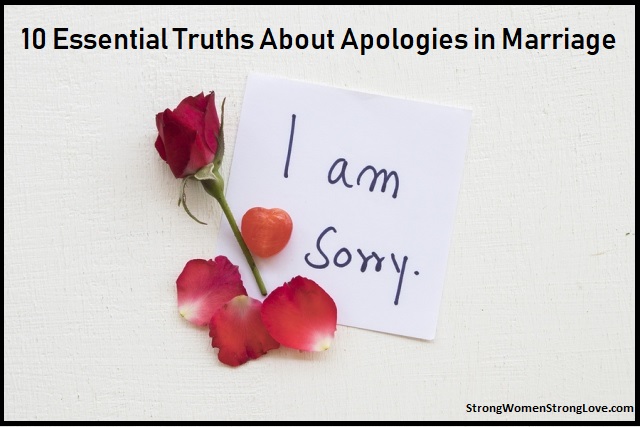by Strong Women Strong Love | Apr 1, 2018 | Books, Passionate Partnership |

In my last post, I talked about the importance of repair in your relationship. All couples go through conflicts, misunderstandings, and hurt feelings, and it’s very important to resolve them.
One of the tools you need in your relationship repair kit is the ability to give and accept an apology. Apologies are so important that renowned psychologist and relationship expert Harriet Lerner devoted an entire book to the subject: Why Won’t You Apologize? Healing Big Betrayals and Everyday Hurts. This book is required reading for strengthening your marriage, not to mention all the other relationships in your life.
Adapted from Lerner’s work, here are 10 essential things you should know about apologies:
- Apologizing well requires listening deeply to the person you hurt. Your apology should begin by fully understanding their feelings and experience, no matter how difficult they are for you to hear.
- A good apology also requires taking responsibility. A hurt person wants you to carry some of the pain of the situation with him. She also needs assurances that the same situation won’t happen again.
- A bad apology can make things worse than no apology at all.
- Common mistakes people make when apologizing include: making excuses, over-explaining, blaming the other person for your mistake, and bringing up things the other person did wrong in the past.
- A consistent failure to apologize harms a relationship, even if things are otherwise good. When both partners have the ability to apologize, the relationship is stronger and healthier.
- An apology doesn’t have to be the last word on a situation. Think of it as opening the door to future communication.
- In situations where the hurt runs very deep, an apology isn’t a one-time event. At these times, you must commit to ongoing listening and repair of your relationship.
- Apologizing when you’ve caused deep harm requires a strong sense of your own self-worth. Without it, you’re more likely to be defensive by doing things like minimizing, rationalizing and denying the pain you have caused.
- If your partner fails to apologize to you, that’s typically an indication of his low self-worth, not that he doesn’t love you.
- You don’t have to rush to forgiveness after an apology. In fact, doing so can cut short your healing process. Forgiveness also doesn’t have to be total for your relationship to move past the issue.
I encourage you to be quick to offer sincere apologies to your husband. Also, be receptive to his sincere efforts to make amends. If either partner’s failure to apologize is a trouble spot in your marriage, make it a priority to explore Lerner’s work together.
by Strong Women Strong Love | Mar 18, 2018 | Poisonous Patterns |

All relationships are different. But I can tell you one thing for certain about yours: Both you and your husband have messed up at one time or another. And both of you will again.
That doesn’t mean your marriage is bad. It just means that you are two human beings in a relationship. The important thing is what happens after you’ve messed up.
Choose the Right Tools
You might remember that we’ve talked before about the work of the Gottman Institute. From his studies of married couples, Dr. John Gottman identified behaviors that separate the Masters of Marriage (couples who have been married for a long time and still like each other) and the Disasters of Marriage (those headed for divorce).
Gottman discovered that one of the most important qualities of a strong couple is the ability to address and recover from conflicts, hurts and mistakes. Gottman calls this process repair. And a repair attempt is “any statement or action – silly or otherwise – that prevents negativity from escalating out of control.”
A meaningful apology is one of the most valuable tools in your relationship repair kit. But it’s not the only one. Other examples of repair attempts include:
- Asking to start a conversation over if it seems like the two of you aren’t hearing each other.
- Suggesting taking a break so you can both get to a calmer place.
- Being physically affectionate or reassuring.
- Using humor or trying to lighten things up.
The best repair attempt to use with your partner — or for him to use with you — depends on your individual needs. Maybe, for example, physical affection instantly starts repairing a conflict for you, but it feels too emotionally intense for him until you both get a calmer place. The Gottman Institute has a repair checklist that I recommend talking about together before the next time the two of you need to practice relationship repair. The list will help each of you understand which repair attempts the other responds to.
Maintenance Is Important Too
Making effective repair attempts is only part of the equation, though. The real measure of how well you can navigate trouble spots in your relationship is how receptive you are to connecting with each other on a regular basis. Gottman has found that the Masters are responsive to their partner’s attempts to communicate or connect about 86% of the time, while the Disasters group only responds about 33% of the time! If the door to connecting is closed most of the time, it’s even harder to open when you are having trouble.
It is critical to pay attention to the overall emotional climate of the marriage. I’ve written before about why regular maintenance is essential for your marriage, and this is one more reason. When the two of you are regularly kind, respectful and appreciative with each other, it makes sense that you’ll be more open to repairing your relationship when things go awry.
To sum it all up, here’s a quick “maintenance and repair guide” for your marriage.
- Establish a strong foundation by having positive interactions with each other daily.
- Understand the repair attempts that you and your husband respond to.
- Be generous in making repair attempts when you hit a trouble spot.
- And be generous in accepting your husband’s repair attempts.
In my next blog article, we’ll continue to build your skills in healing both small and large rifts in your marriage. I’ll go into more depth on making, and accepting, apologies. In the meantime, you can get more strategies for building a marriage that can withstand conflicts in my book Strong Women, Strong Love.



